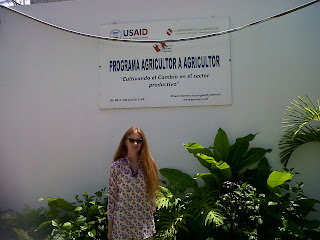Florida Queen-Rearer Generates Positive Results in Leon, Nicaragua
Khara Matcham of Melbourne, FL, is back in the U.S. after a 3-week visit to Leon Nicaragua, 2 hours northwest of Managua. Ms. Matcham is the Owner of a queen-producing apiary - Sorority House Queens, Inc. - in Melbourne, as well as a Beekeeper at Sunshine Apiary, Inc. in Windsor, ME.
Just the 4th beekeeper to work with our Nicaragua Country Program, Ms. Matcham's assignment focused on queen rearing. Volunteers typically meet with a few different host organizations while in-country, however due to the strict, attention-demanding nature of queen rearing, the full 3 weeks were spent with La Leonesa, an organic beekeeping cooperative in Leon composed largely of young men with less than 5 years of beekeeping experience.
With translation support from the daugther of Leonesa's director, Ms. Matcham provided training to 9 of Leonesa's members. One day was spent in a classroom-like setting, during which Ms. Matcham shared her own queen rearing methods with the group. The other days were spent out in the field examining hives, setting up breeders and grafting to produce viable queen cells.
Ms. Matcham's visit with La Leonesa had several positive outcomes. After 4 rounds of grafting, the group produced viable queen cells that can be used in the upcoming weeks. And Ms. Matcham - never having worked with Africanized bees previously - learned that they can be pretty mellow if handled properly and dismissed the "killer bee" image that she previously held.
 |
| Volunteer, Khara Matcham, in front of the Farmer to Farmer Field Office in Managua. |
With translation support from the daugther of Leonesa's director, Ms. Matcham provided training to 9 of Leonesa's members. One day was spent in a classroom-like setting, during which Ms. Matcham shared her own queen rearing methods with the group. The other days were spent out in the field examining hives, setting up breeders and grafting to produce viable queen cells.
Ms. Matcham's visit with La Leonesa had several positive outcomes. After 4 rounds of grafting, the group produced viable queen cells that can be used in the upcoming weeks. And Ms. Matcham - never having worked with Africanized bees previously - learned that they can be pretty mellow if handled properly and dismissed the "killer bee" image that she previously held.

.png)

Comments
Post a Comment